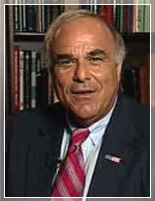Seven commodity and ethanol organizations have written a letter to President Bush in support of the secondary tariff on imported ethanol. The groups called attention to the importance of the tariff for the nation’s growing ethanol industry, as well as to the nation’s energy, economic, and environmental security.
The American Coalition for Ethanol (ACE), Ethanol Producers and Consumers (EPAC), National Association of Wheat Growers, National Corn Growers Association, National Farmers Union, National Sorghum Producers, and the Renewable Fuels Association (RFA) pointed to factors such as oil prices, rising demand, drought, and declining value of the dollar as having more effect on the price of food than biofuels. They urged the President to avoid yielding to the misdirected efforts to blame ethanol for rising prices and to prevent American taxpayers from subsidizing foreign products.
 “Removing the tariff would not lower food prices,” said RFA president Bob Dinneen. “Such an action would halt development of new ethanol technologies and take the jobs and economic opportunity being generated by the domestic ethanol industry to foreign countries. I strongly encourage President Bush to recognize that skyrocketing oil prices play a far greater role in the complex issue of food prices than does ethanol and reject the efforts to remove the secondary tariff.”
“Removing the tariff would not lower food prices,” said RFA president Bob Dinneen. “Such an action would halt development of new ethanol technologies and take the jobs and economic opportunity being generated by the domestic ethanol industry to foreign countries. I strongly encourage President Bush to recognize that skyrocketing oil prices play a far greater role in the complex issue of food prices than does ethanol and reject the efforts to remove the secondary tariff.”
The 54 cent per gallon secondary tariff was enacted by Congress in 1980 to offset any incentive for imported ethanol to benefit from the 54 cent per gallon tax credit for ethanol blended into motor fuel. The tax credit is taken by refiners who blend ethanol into motor fuel and the purpose of the secondary tariff is to protect American taxpayers from subsidizing imports.


 Biofuels groups from the US, Canada, Brazil and Europe put aside their differences this past week to present a united front to world leaders meeting in Japan.
Biofuels groups from the US, Canada, Brazil and Europe put aside their differences this past week to present a united front to world leaders meeting in Japan. Nearly three years after Hurricane Katrina slammed into New Orleans, destroying a large portion of the city and trashing more than half of its 370 buses, the city is getting some public transportation fueled by biodiesel.
Nearly three years after Hurricane Katrina slammed into New Orleans, destroying a large portion of the city and trashing more than half of its 370 buses, the city is getting some public transportation fueled by biodiesel. Pennsylvania Governor Ed Rendell has signed into law measures that will provide incentives to biodiesel producers while mandating a rising scale of biodiesel percentages in all diesel sold in the state.
Pennsylvania Governor Ed Rendell has signed into law measures that will provide incentives to biodiesel producers while mandating a rising scale of biodiesel percentages in all diesel sold in the state.
 Originally created to replace over 100 separate newsletters POET distributed every year, Vital is putting a face to the ethanol industry. Throughout 2008, Vital will base its editorial on four main themes: the future of ethanol, community profiles, industry information and environmental advancements.
Originally created to replace over 100 separate newsletters POET distributed every year, Vital is putting a face to the ethanol industry. Throughout 2008, Vital will base its editorial on four main themes: the future of ethanol, community profiles, industry information and environmental advancements. 
 Deputy Assistant Energy Secretary Steven Chalk told the Senate Environment and Public Works clean air subcommittee that keeping the current RFS policy in place is “critical to ensuring growth in all parts of the biofuels supply chain, from feedstocks, to biorefineries, to infrastructure, including pipelines.”
Deputy Assistant Energy Secretary Steven Chalk told the Senate Environment and Public Works clean air subcommittee that keeping the current RFS policy in place is “critical to ensuring growth in all parts of the biofuels supply chain, from feedstocks, to biorefineries, to infrastructure, including pipelines.” DuPont vice president for technology John Pierce told the committee that the expanded RFS is an attainable goal, both in terms of corn ethanol and cellulosic. “In fact, there are multiple technology developers intending to produce cellulosic ethanol in pilot or demonstration quantities from a range of feedstocks over the next 24 months. The economics and carbon performance of grain ethanol continues to improve as well, as does agricultural productivity and sustainability in the US. These trends suggest that while the RFS targets are aggressive, as they should be, they are not out of reach.”
DuPont vice president for technology John Pierce told the committee that the expanded RFS is an attainable goal, both in terms of corn ethanol and cellulosic. “In fact, there are multiple technology developers intending to produce cellulosic ethanol in pilot or demonstration quantities from a range of feedstocks over the next 24 months. The economics and carbon performance of grain ethanol continues to improve as well, as does agricultural productivity and sustainability in the US. These trends suggest that while the RFS targets are aggressive, as they should be, they are not out of reach.” Scientists with the National Aeronautics and Space Administration (NASA) are using nearly 10 years of satellite information to figure out where is the best place on the oceans to put up wind energy turbines.
Scientists with the National Aeronautics and Space Administration (NASA) are using nearly 10 years of satellite information to figure out where is the best place on the oceans to put up wind energy turbines. QuikSCAT, launched in 1999, continuously tracks the speed, direction and power of winds near the ocean surface to predict storms and enhance weather forecast accuracy.
QuikSCAT, launched in 1999, continuously tracks the speed, direction and power of winds near the ocean surface to predict storms and enhance weather forecast accuracy.